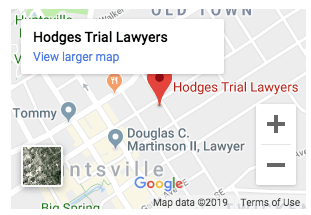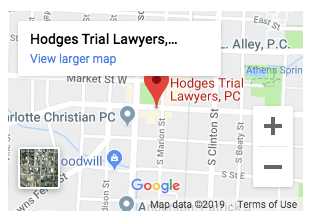When you start a personal injury claim, you may be surprised just how easy it is to do something wrong. Talking to the other party’s insurance company: bad for your claim. Blasting the liable party on social media: bad for your claim. Documenting your journey publicly: also bad for your claim. The fact is, doing the wrong things during a claim can seriously harm your credibility and make it hard for you to get the compensation you deserve.
Find out how you can protect your credibility as you seek compensation. When you’re ready to discuss your claim in greater detail, call Hodges Trial Lawyers at 256-826-4129.
Why Credibility is So Important
Credibility is important in every aspect of life, but especially in a personal injury claim. Consider this: insurance companies don’t like parting with their money. If they have any reason to believe that you aren’t being truthful or you aren’t deserving of a settlement, they will do whatever it takes to keep you from getting compensation. Credible victims have an easier time getting full and fair compensation in a timely manner.
Use these tips to safeguard your credibility as you fight for justice.
Seeking Medical Care
Prompt medical care is important after an injury. It shows that you are genuinely worried about your health and committed to protecting it after an accident. The longer you wait after an accident to get checked out, the easier it is for the insurance company to cast doubt on you.
Staying Quiet About Your Accident
This can be difficult, especially if the party liable for your accident was egregiously negligent. However, going public can only hurt you. There’s a lot of leverage in one’s reputation, and if you can keep the details to yourself while negotiating a settlement, it may help you in the long run. While you can talk to close loved ones about your recovery, avoid posting details about your accident or personal injury claim on social media or going to the news with it.
Adhering to Your Treatment Plan
Acting in good faith is an essential part of protecting your credibility. That means doing everything in your power to work towards a full recovery. The other party’s insurance company will be able to review your medical records, and they will definitely be looking for evidence that you are not complying with your doctor’s orders.
If you aren’t following your doctor’s treatment plan, that’s a sign that either you aren’t taking your injury very seriously or the injury isn’t as severe as you claimed. In either case, they can use it against you when it comes to negotiating a settlement. When your doctor recommends treatment, you should do everything you can to follow it. Document your efforts and keep an open line of communication with your care team.
Sticking to the Truth
An ever-changing story is a huge red flag for insurance companies. That’s one of the reasons you shouldn’t give them a recorded statement. As the details settle in your mind, any minute changes will give them a reason to dig deeper and look for inconsistencies. Whenever you have to talk about your accident and subsequent injuries, be truthful and make sure you tell the same story every single time.
Avoiding Contradictions
If the insurance company is really committed to keeping you from a settlement, they may hire a private investigator to keep an eye on you as you recover from your injuries. During this time, anything that contradicts what you told them will work against your claim.
As an example, imagine an injury where you say that you cannot stand for long periods of time due to pain. As a result, you are off from work indefinitely. If you are seen standing at a standing-room-only concert, that obviously goes against what you told the insurance adjuster.
Explore Your Legal Options with Hodges Trial Lawyers
If you’re ready to get started on your personal injury claim, we’re here to guide you through the process. Let’s sit down and talk about your next steps. Give us a call at 256-826-4129 or send us a message online to set up a consultation now.



